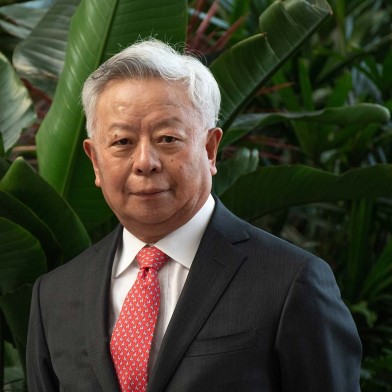A couple of weeks ago, Singapore’s Finance Minister Lawrence Wong announced the 2024 Budget. Leonard Hong explains more.
In Singapore's 2024 budget, as with other countries, immediate social spending and investment was prioritised as a response to the ongoing cost-of-living crisis and challenges relevant to long-term productivity and population ageing.
However, there is a stark contrast between the city-state and other major developed economies. Singapore has net zero debt, and it has already solved the long-term fiscal issues facing other countries.
Singapore's government gross debt level is 170% of GDP. But this is offset by high levels of domestic savings in both the public and private sectors. The city-state is a capital exporting country that generates reserves from its large financial assets and public investments.
A large portion of the public sector comprises large government-linked companies – such as SMRT Corporation and Singapore Airlines – and its sovereign wealth funds – including the Government Investment Corporation (GIC) and Temasek Holdings.
GIC has around US$770 billion in assets under management and Temasek has US$290 billion. In combination this is around 270% of Singapore’s GDP.
In contrast to libertarian claims that governments should simply reduce wasteful spending, Singapore's approach to fiscal policy involves an effective and strategic government that leverages the state as an investment vehicle.
Former Singaporean Finance Minister Goh Keng Swee said it best, “Our experience confirms some of the conventional wisdom of growth theory but refuses much of the rest. The role of government is pivotal.”
Simultaneously, in the private sector, the Central Provident Fund (CPF) plays a fundamental role providing social insurance to their citizens, but in the form of self-provision rather than a ‘pay-as-you-go’ social security system in the West.
Singaporeans are required to save up to 20 percent of their wages, and an additional 17 percent is provided by their employers, which is invested by the CPF Board. As of 2023, CPF managed around US$571 billion – 143% of GDP.
Overall, Singapore's fiscal management has been outstanding, and its prudent fiscal management has allowed Singapore to thrive as the diamond of Southeast Asia. The city-state currently has a very high net worth position.

Leornard Hong attended Youths' Future Dialogue 2023 with Singapore's Deputy Prime Minister and Finance Minister Lawrence Wong. Photo: courtesy of the author.
I came to study in Singapore to understand precisely why this was possible and what policy lessons the city-state could provide for New Zealand.
I was inspired by Lee Kuan Yew’s story. It was in 2019 when I first read his autobiography, “From Third World to First: The Singapore Story, 1965-2000.” It sparked my desire to study in Singapore and learn about its unique and unorthodox economic model and policies.

Leonard Hong is currently pursuing his master's at the S. Rajaratnam School of International Studies (RSIS) of Nanyang Technological University in Singapore, funded by New Zealand's Prime Minister's Scholarship. Photo: courtesy of the author.
My time in the city-state has made me realise that we have much to learn from its fiscal policies – particularly around public asset management. In contrast, our economic history has a mixed record.
For New Zealand, we missed the golden economic opportunity when then-Prime Minister Sir Robert Muldoon cancelled our superannuation scheme in 1975. It was one of the worst economic decisions made by a government. If we didn’t, New Zealand would have much higher domestic savings potentially as high as NZ$500 billion today.
Sir Michael Cullen's decision to revive a private saving scheme under KiwiSaver in 2005 was a sensible decision, but it was insufficient. The total KiwiSaver funds currently under management is NZD$105 billion – 25% of GDP. It is an automatic enrolment scheme with minimum and maximum contribution rates of 3% and 10%. This is much lower than Singapore’s compulsory rates for both employers and employees.
Cullen also introduced our sovereign wealth fund – the New Zealand SuperFund (NZ SuperFund). It was an innovative policy developed in 2001 based on his long-term foresight and prescience that demographic ageing would result in significant increase in pension demands. Our sovereign wealth fund currently has a balance of NZD$70 billion – 18% of GDP – but liquidations will start soon in 2033.
Since the passing of the 1994 Fiscal Responsibility Act, there was strong bipartisan consensus of ensuring persistent budget surpluses. This institutional framework allowed our nation to weather the storms of the 2007-08 Global Financial Crisis and the COVID-19 pandemic because of our low debt position of 19% of GDP in 2019.
Yet, in stark contrast to Singapore, New Zealand has not been able to build greater public assets that could be utilised in favour of the long term. There is no doubt that our KiwiSaver plans are competent, but their investments have not been diversified, with a significant portion of funds being invested passively abroad. Regulatory hurdles have hindered the growth of the sector and greater competition.
Simultaneously, the NZ SuperFund is regarded highly internationally, with annualised investment returns being around 10% over the past 20 years. However, there was a lost opportunity when the previous National-led government ended its contributions to the NZ SuperFund for the sake of lowering budget deficits.
It is clear that based on the projections from the New Zealand Treasury, demographic change and population ageing will have substantial fiscal implications with net debt expected to reach above 160% by 2060. In the words of late Harvard economist Martin Feldstein, “The current structure of pension systems in most developed countries cannot be sustained without cutting benefit levels substantially or introducing much higher taxes.”
Therefore, whilst maintaining fiscal discipline, pursuing the development of much greater public assets and ‘nudging’ individuals and households towards greater domestic savings is fundamental to New Zealand’s long term fiscal position. Singapore’s unorthodox but pragmatic economic model provides some answers to our future challenges.
Finance Minister Nicola Willis should consider examining parts of Singapore’s macroeconomic strategy – it’s not just about balancing the books but identifying methods in building significant domestic capital savings and developing strategic government assets in the interests of the public.
+Opinions expressed are those of the author+
About the author:
Leonard Hong is a NZ Prime Minister’s Scholar for Asia studying for a master’s degree in international political economy at Nanyang Technological University, Singapore. He is also a member of the Asia New Zealand Foundation's Leadership Network.
-Asia Media Centre


